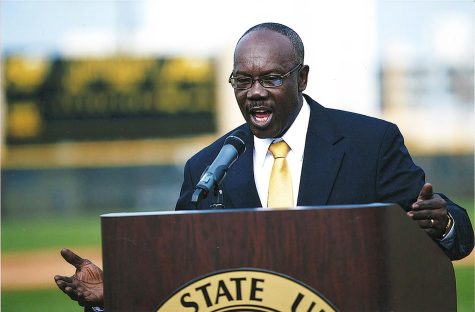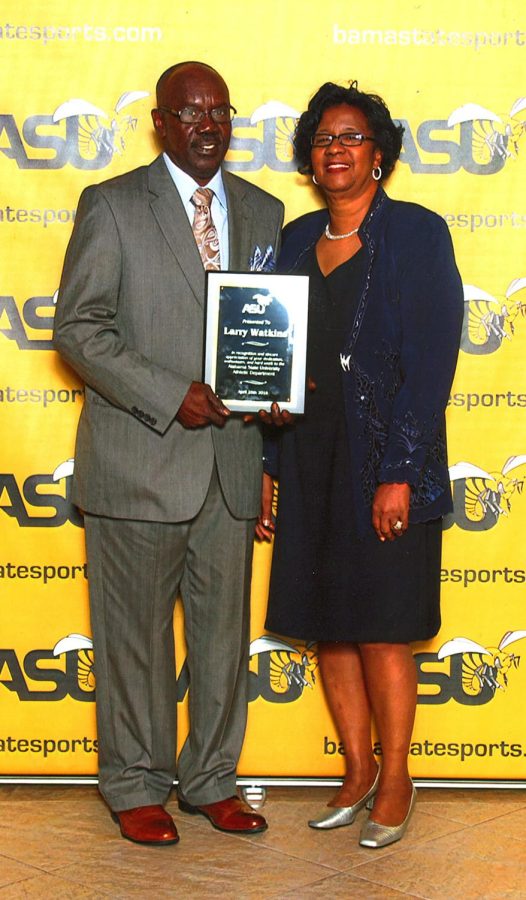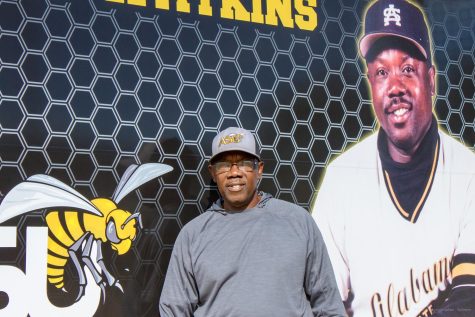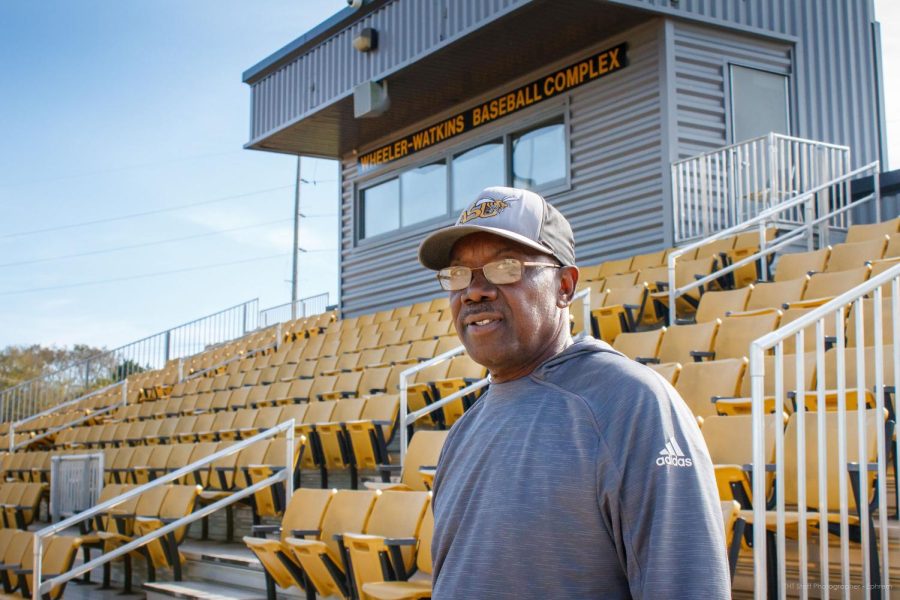Watkins values his time as a Hornet and coach
After 50 years of either attending Alabama State University or working at the university, living legend Larry Watkins, Sr. is still making a difference at the university through his work with students.
October 23, 2021
Caring is a virtue that everyone performs differently. People often forget or misunderstand the impact they have on others’ lives. In the school setting, a teacher and a coach are two prominent figures that care and impact hundreds of students. To do this takes great character, love and passion, and Larry Watkins exemplifies all of this at Alabama State University.
Watkins served as the head coach of the Alabama State University Hornet baseball team for 30 years. During his tenure, he won 513 games, making him the all-time leader in wins in school history and one of the leaders in the Southwestern Athletic Conference. As a SWAC Conference Hall of Famer and a Thomasville Sports Hall of Famer, his reputation precedes him.
Watkins was born in Thomasville, Alabama, and raised by his grandmother, Fannie Cowan. Watkins had an interesting childhood losing his mother at the age of five. Coming out of A.L. Martin High School in 1969, he had no idea what he wanted to do.
He attached himself to baseball, and it was here where his high school coach, Dan Lewis, impacted his life.

“Coach saw something in me that I did not see in myself,” he said.
Watkins began his baseball journey on a full scholarship to Selma University in Selma, Alabama. There he played on the baseball team until 1971.
Selma University operated as a highly religious school that would train ministers. His coach advised him that Selma would be a great start and would improve his skills.
“I cannot forget Selma University. That’s where I got started.” He explains that his grandmother pushing religion is what carried him even to this day, and Selma University was the perfect place to attend.
Lewis would later encourage Watkins to attend Alabama State University, where he helped him prepare for the ACT and introduced him to the campus and coaches there. He credits much of his success and knowledge to Lewis, teaching him everything he knows and what’s carrying him today.
“There are still so many people in Thomasville who touched my life,” Watkins said, “one of those being Alphonso Arnold.”
The late Arnold coached a team of boys and young men who otherwise would not have an opportunity to play baseball. There was no baseball program at A.L. Martin High School before Lewis arrived, and it only lasted one year during his tenure.
“We were young boys that were playing with grown men,” Watkins said. “With the summer league team, they used to get all the young boys who showed an interest and who had talent, and they taught us how to play the game.”
The Thomasville community had many people involved in a path that would take Watkins through the next 50 years of his life. Watkins reflects and understands more of what his grandmother meant when she would say, “It takes a whole village to raise a child. “So many people were involved in getting me to where I am today.”
As a talented student-athlete, Watkins stayed close to baseball. While playing, he was given the nickname “Toy Cannon” due to his impressive ability to run and throw the ball from the outfield to get runners out. His throwing skill was compared to a ball being “shot out of a cannon.”
One of his best collegiate games came when the Hornets played Florida A&M in the 1972 season. Watkins recounts throwing three or four of the runners out when they were trying to tag up and take a base.
“We ended up winning that game defensive-wise. I didn’t miss anything in that outfield. If it was hit in my direction, you could count it as an out,” Watkins said.
While playing, Watkins was a member of the first Hornet baseball team to participate in the NCAA Playoffs following the 1974 season.
Off the field, Watkins recalls the fun memories of being an undergraduate student. He describes how the school had an immense sense of pride and spirit where everyone supported everybody. There was Hornet pride that spread throughout the school and was loved by the students. He vividly remembers basketball games being played at the Dunn Arena (now Fred L. Shuttlesworth Dining Hall) and how it would be so jammed packed.
“Students had to arrive two hours early before tip-off,” he said. “The stands would be filled with everyone having their own section; fraternities, sororities, the football team, etc. It would be so full; sometimes, the crowd had to catch a few players too close to the sidelines,” Watkins said humorously.
Before Watkins could finish walking across the stage during graduation, Herbert Wheeler, Watkins’ baseball coach, gave him a slip of paper and Watkins, without reading it, immediately placed it in his pocket. After Wheeler advised Watkins to look at it, Watkins noticed that it was an acceptance letter to Alabama State’s School of Graduate Studies.
Watkins would begin to work as a graduate assistant coach under Wheeler. Watkins had no plan other than to graduate and get a job.

“I had no idea of becoming a coach, no thought whatsoever, but Coach Wheeler saw something in me that I didn’t see in myself,” Watkins said. His sensational skills on the baseball field directly translated to his knowledge as a coach, and it was a perfect fit to be the right hand to Wheeler.
Under the tutelage and guidance of Wheeler, Watkins gained a lot of knowledge. Watkins said that Wheeler planted the seed for everything he could even imagine as a coach and even post-retirement.
“He molded me,” Watkins said. “He molded me to become the next head baseball coach at Alabama State University.”
While being a graduate assistant, Watkins stayed to himself and out the way. As a 22-year-old assistant coach, Watkins understood that he could not be seen just doing any and everything. He had a reputation and image to protect.
“Nobody could take my mind or focus,” he said.
This, along with his strong devotion and relationship with God, kept him on the straight and narrow path and kept him focused on the goals that he wanted to obtain. To stay busy was to stay focused. Watkins was steadfast on his intentions and plans, “always use your time and use it effectively before it is gone,” he said.
Coming into the 1982 season, head coach Wheeler surprisingly announced his retirement in January, right before the season started. However, Wheeler had faith and knew Watkins was ready and served as head coach for the next 30 years.
One of Watkins’ biggest pillars as a coach was to care for the students.
“Students before ballplayers … I want to develop them for life.” A quality and mindset he says Wheeler implemented into him when he was an undergraduate.
One thing Watkins did to accompany this was taking his team to church every Sunday when there was no game. Watkins and his team would travel to different churches, and they all understood the importance of not being late.
He would take it further, pushing and guaranteeing that his athletes would graduate.
Watkins did not just see the students who played on the team as just players or faces on the campus, but human beings he had the ability to impact. Moments like this tie back to his youth when he had coaches like Lewis and Wheeler who looked out for him.
“There is an old saying that you try to help people because someone helped you along the way. God put us here to help people,” he said.
Watkins expressed that he gets emotional every birthday because of the overflow of calls from all his former players. They are quick to tell him just how much he impacted and changed their lives in ways he does not even know.
Upon stepping into the head coaching role, Watkins did not waste time getting change implemented. One of his first actions was to renovate the baseball field. A new layout, a modern scoreboard, and the installation of an outfield fence were completed that made a noticeable difference and improvement to the program.
While coaching, Watkins had his hands full in other areas around the school. Along with responsibilities as the head coach, he also was a physical education instructor and head equipment manager for the football team.
“After obtaining my master’s degree, I was given a teaching position at the university as a physical education instructor,” Watkins said. “Not only did I teach every semester, I was the head baseball coach and the equipment manager for the football team. I was always busy, and it kept me out of trouble.”
With so much to be accountable for, Watkins looked at all of these as areas he could provide his touch of care and assistance as part of his life’s journey. His most personal being the fact he had the chance to coach his son Larry Watkins Jr.
Watkins recalls it being a challenge for his son due to the players initially thinking he would play because he was his son. However, quickly the team learned that Watkins Jr. was extremely talented and even started as a freshman. Watkins enjoyed his time coaching and having his son on the team. Like every journey, there are obstacles and roadblocks. Watkins described his biggest being the 1996 season.
During the ‘96 season, the baseball team used to play and practice at Hornet Stadium (the baseball field used to be located next to the track field). However, because of the 1996 Olympic Games, an African national team used the area to practice. Because of this, Watkins and his team were without a place to practice. As a consolation, Watkins received a van and had to commute to various practice fields. The van was dubbed “The baseball field on wheels.” This provided an insurmountable challenge that most other teams did not have to worry about. Yet, the team remained highly successful, finishing 19-9 in conference play.
From 1996-2011, the baseball team was without a facility to call their own. During this time, it was common to see the baseball, football, and track team all out and practicing at the same time in the heat of the day. This did not slow Watkins down, and his team would continue to find success through it all. He strategized a way to practice with the infield players when the football players were in close proximity on the field. Watkins would hold batting practice earlier in the practice session, before football would get to the field to avoid them from getting hit.
Watkins led the Hornets to the postseason SWAC tournament 11 times and was named the SWAC Eastern Division Coach of the Year twice. He would follow this up by being named SWAC Coach of the Year.
In his 30th year at the university, the Wheeler-Watkins Baseball Complex made its debut. Watkins would coach one year on the field before retiring. Upon retiring, the complex was dedicated to Watkins and Wheeler being renamed the “Wheeler-Watkins Baseball Complex.”
Watkins looks at himself as a “pathfinder” for what the university and team have now.
“God put us here to help along our way,” Watkins said. The reward he is receiving is seeing the change and evolution around the whole campus. He loves seeing the evolution of how far the university has come, especially having such fingerprints in a lot of things implemented.
He is also thankful to the administration for keeping him around and allowing him to still be involved at his alma mater.
“God got me here doing what I love to do. Anything I can help ASU with, I am here to help ASU with,” Watkins said.
 “We got to continue to move forward. We can’t stop growing … and we must get closer.” Watkins also believes the current tone of the school and students is “spread out too far,” and there should be an increase in the student population.
“We got to continue to move forward. We can’t stop growing … and we must get closer.” Watkins also believes the current tone of the school and students is “spread out too far,” and there should be an increase in the student population.
Although he says he is quiet and stays to himself, you can occasionally see Watkins cruising around campus on his golf cart. He enjoys seeing and interacting with the younger generation and even uses the new things he picks up with his children and grandchildren.
Watkins has created a legacy that is etched in Alabama sports history. His experience has led him to be a member of several nationally recognized organizations, including the American Baseball Coaches Association, Alabama Baseball Coaches Association, Outstanding Young Men of America, Who’s Who in Society, Board member of the A.L. Martin Historical Museum, and member of Phi Beta Sigma Fraternity, Inc.
After being inducted into the SWAC Conference Hall of Fame, he was awarded the Charles “Chuck” Prophet Memorial Award, which is given to an employee of a SWAC institution that exhibits spirit, dedication and loyalty to their school and conference. In 2021, Watkins was inducted into the Thomasville Sports Hall of Fame and The Alabama State University Hall of Fame as part of the 1991 Football National Championship team.
Off the baseball diamond, Watkins is devoutly religious, and married to Louvenia Watkins. Together they have three children named Kamela, Christopher and Larry Jr.
Watkins remains active at O’ Mother Dear, currently serving as the special assistant to the athletic director, overseeing the universities’ athletic facilities, game-day operations and serving as an instructor in the physical education department.
2021 marks Watkins’ 50th anniversary of being at Alabama State since first stepping on campus in 1971. Watkins remains thankful to everyone and is never hesitant to do what he can for his university, saying, “I love ASU. This is my life.”








Arnold Latonya • Jan 8, 2022 at 6:01 pm
As growing up I wo6d always hear m dad talk about Lrry Watkis and as I got older I knew who Larry was.My dad always praised this man..My father is the late Coach Alphonso Arnold.Congratulaions Coach Larry Watkins.
Debra Dickinson • Jan 8, 2022 at 2:19 pm
Congratulations!!!
May God continue to bless you and your family. Your confidence, dedication and your love for God paid off. Love you, Debra Dickinson.